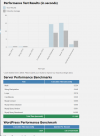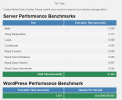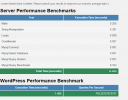lanix343
Basic Pleskian
Hey Folks,
I've been having a quite frustrating issue that I can't seem to solve. I am running mostly simple and small WordPress Websites on the Server and performance when updating/installing Plugins or doing anything in the Backend is slow.
Using a Plugin called WPPerformanceTester I've been able to compare Queries Per Second on a few different servers and my Sever seems to be very slow when it comes to QPS. I am a novice and I can only tell that the Sites are running rather slow on my server as opposed to other Servers. I asked the Host to check it out and they are also surprised as the QPS on other Servers on the same hosting environment are much faster. It seems that Plesk has something to do with slowing down the DB....
Here is a screenshot of my Plesk Server:
Here are the specs (in German sorry):

And the Performance Test:
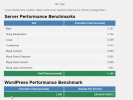
and with another tool:

The performance issue seems to relate to these 2 Points:

Here is a snapshot of that same test on a different very cheap shared server (GoDaddy):

And the QPS Test on that same cheap server:
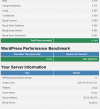
As you can see there are quite big difference in performance.
I have another Server also Running plesk. That one is slower than the cheap shared server but still much faster than my main server with the best hardware specs.
Any ideas how I can optimize DB Speed for my main server?
Best
Thomas
I've been having a quite frustrating issue that I can't seem to solve. I am running mostly simple and small WordPress Websites on the Server and performance when updating/installing Plugins or doing anything in the Backend is slow.
Using a Plugin called WPPerformanceTester I've been able to compare Queries Per Second on a few different servers and my Sever seems to be very slow when it comes to QPS. I am a novice and I can only tell that the Sites are running rather slow on my server as opposed to other Servers. I asked the Host to check it out and they are also surprised as the QPS on other Servers on the same hosting environment are much faster. It seems that Plesk has something to do with slowing down the DB....
Here is a screenshot of my Plesk Server:
Here are the specs (in German sorry):

And the Performance Test:

and with another tool:

The performance issue seems to relate to these 2 Points:

Here is a snapshot of that same test on a different very cheap shared server (GoDaddy):

And the QPS Test on that same cheap server:

As you can see there are quite big difference in performance.
I have another Server also Running plesk. That one is slower than the cheap shared server but still much faster than my main server with the best hardware specs.
Any ideas how I can optimize DB Speed for my main server?
Best
Thomas






